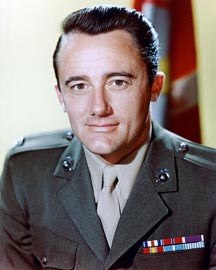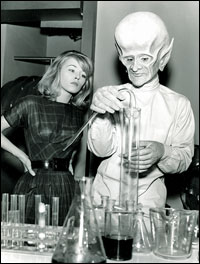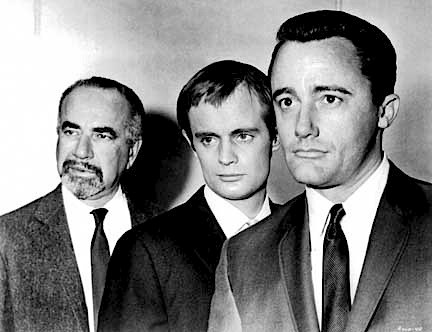



1963
March 1963
Ian Fleming, passing through New York on his way home to London
after his annual stay at Goldeneye, discusses Solo with Phyllis Jackson.
She starts negotiations with MGM for Fleming’s participation in the
series. NBC reconfirms that it will put an Ian Fleming TV series on the
air without a pilot. At the same time, Felton, realizing Fleming will not
devote the time necessary to actually creating a concept ready for
weekly production, enlists Sam Rolfe to develop a full series
presentation.
April 1963
On Her Majesty’s Secret Service is serialized in the April, May
and June issues of Playboy.
April 1963
On Her Majesty’s Secret Service, eleventh Bond book, is published
in England.
April 1963
MGM offers proposed deal for Fleming’s services on Solo.
April 1963
Sam Rolfe goes to work on revised and expanded Solo presentation.
Wednesday, April 17, 1963
Robert Vaughn appears in The Dick Van Dyke Show episode “It’s a Shame She Married Me.”
Wednesday, May 8, 1963
United Artists opens “Dr. No” at 450 U.S. theaters in the Midwest and Southwest.
Wednesday, May 8, 1963
Ashley-Steiner informs MGM of counterproposal from Fleming on various points in Solo deal.
Tuesday, May 14, 1963
New York entertainment lawyer Ronald S. Konecky, in a letter to Fleming, delivers his legal opinion that Solo is not an infringement on Eon’s James Bond film rights.
Tuesday, May 14, 1963
Sam Rolfe delivers five-page memo to Norman Felton outlining in print for the first time the Solo format developed to date — with an organization known as U.N.C.L.E., headed by a Mr. Allison, employing Solo and agents of all nationalities, “even Russians,” and recurrent encounters with an international criminal group called Thrush. Rolfe eliminates Doris Franklyn, who’s both a secretary to Solo’s boss and a part-time actress in the Fleming-Felton notes, adding Allison’s secretary Miss Marsidan, “who is fat, fifty and somewhat on the motherly side.”
Monday, May 20, 1963
Agreement between Rolfe and Arena is executed for Rolfe to rewrite the existing Solo format, develop story ideas and make further contributions to the format, and to travel to London and other sites in Europe for discussions with Fleming and to scout possible locations.
Tuesday, May 28, 1963
Fleming writes to Ashley-Steiner indicating that he does not want to participate in Solo after all.
Wednesday, May 29, 1963
“Dr. No” opens in New York and Los Angeles.
Friday, June 7, 1963
Felton mails Fleming the Solo material for his review, now refined and expanded into 12 typewritten pages but still, as Felton notes, in a form that only he and Rolfe have seen. But, he tells Fleming, “things network-wise are moving fast, and I will probably have to give out some if not all of the flavor of the series. But, we can make changes, and I want the benefit of having your suggestions. Write them on the margin of the paper, on a telegraph blank or a paper towel and send them along.”
Saturday, June 8 – Wednesday, June 12, 1963
Jerry Leider of Ashley-Steiner travels through London and meets with Fleming, who tells Leider that Saltzman and Broccoli have pressured him to drop out of Solo.
Tuesday, June 11, 1963
A second pilot for “The Boston Terrier” airs, this one on ABC and running only 30 minutes, again produced by Blake Edwards and starring Robert Vaughn, and again failing to sell the series.
Thursday, June 13, 1963
Felton sends the Solo prospectus and sample storylines to NBC programming executive Ross Donaldson.
Tuesday, June 25, 1963
Felton travels to London to meet with Fleming. Fleming tells him that various problems — his declining health, the pressure from Saltzman and Broccoli, and the Thunderball infringement suit brought by McClory chief among them — force him to completely withdraw from Solo.
Wednesday, June 26, 1963
At a final meeting in Fleming’s Fleet Street office, Felton gives up trying to persuade Fleming to retain any kind of role in Solo. Fleming signs a document assigning any and all rights to Felton “in any material written or contributed by me in connection with an original television series featuring a character named Napoleon Solo,” in exchange for the token sum of one pound. Fleming’s secretary Beryl Griffie-Williams signs as a witness.
July 1963
Felton must break the news of Fleming’s withdrawal to disappointed MGM and NBC executives. Network programmers tell Felton that, without Fleming’s participation, a pilot will have to be made to keep Solo in contention for a place on the schedule.
Wednesday, July 3, 1963
“The Great Escape,” with David McCallum in a prominent supporting role, opens in the United States. Steve McQueen, Charles Bronson and James Coburn of “The Magnificent Seven” also appear.
Tuesday, July 9, 1963
Rolfe’s new 40-page Solo format is registered at the Writers Guild.
Thursday, July 25, 1963
NBC signs pilot deal for Solo.
Wednesday, Aug. 7, 1963
Arena hires Rolfe to write Solo pilot script.
Saturday, Sept. 14, 1963
The Lieutenant, third Arena-MGM series, premieres on NBC at 7:30 p.m. Created and produced by Gene Roddenberry, series stars Gary Lockwood and Robert Vaughn as officers in the United States Marine Corps. MGM-TV also sells Mr. Novak and Harry’s Girls to NBC and The Travels of Jaimie McPheeters to ABC.

Monday, Sept. 16, 1963
Rolfe turns in first draft of Solo pilot script.
Wednesday, Oct. 2, 1963
Espionage premieres on NBC at 9 p.m. British-produced anthology of spy stories lasts only one season, scheduled a little too soon and played a little too straight to become part of the spy craze.
Wednesday, Oct. 9, 1963
Sam Rolfe turns in second draft of his pilot script. Don Medford signs to direct the pilot.
Wednesday, Oct. 9, 1963
Robert Vaughn appears in The Eleventh Hour episode, “The Silence of Good Men.”
Thursday, Oct. 10, 1963
“From Russia With Love,” the second James Bond film, holds its world premiere at the London Pavilion theater. Film not only breaks box-office records, its huge success guarantees ongoing production of the world’s most popular movie series and, perhaps more than any other event, truly launches the 1960s spy trend.
Monday, Oct. 14, 1963
David McCallum makes his first American television appearance in “The Sixth Finger” episode of The Outer Limits.

November 1963
Thrilling Cities is published in England by Jonathan Cape.
November 1963
Casting of Solo’s running characters is finally set. After debating the merits of numerous leading men with various network executives, Felton offers Robert Vaughn the role of Solo. He signs veteran stage and screen character actor Will Kuluva to play Allison, and gives David McCallum the Illya role after several people bring McCallum to his attention. Casting Vaughn and McCallum fulfills Felton’s goal of presenting adventure heroes “who would be intelligent, not massive in size, witty and interesting,” just as the Illya character allows him to include a non-American hero.

Tuesday, Nov. 5, 1963
Rolfe’s pilot writer’s agreement is amended to give him “development” credit on series.
Wednesday, Nov. 20, 1963
Solo pilot starts shooting at the Lever Brothers soap factory outside Los Angeles, the location used as Thrush chieftain Andrew Vulcan’s chemical plant.
Wednesday, Nov. 20, 1963
Thunderball suit comes to trial in London.
Friday, Nov. 22, 1963
President John F. Kennedy is assassinated in Dallas. Work on Solo halts when cast and crew decide they can’t continue.
Tuesday, Nov. 26, 1963
Solo pilot resumes shooting after Monday’s national day of mourning.
Monday, Dec. 2, 1963
Out-of-court settlement gives Kevin McClory and Jack Whittingham credit in all future editions of Thunderball and, far more significantly, gives McClory the film rights.
Monday, Dec. 16, 1963
Solo wraps principal photography.
Wednesday, Dec. 25, 1963
“The Prize,” spy tale starring Paul Newman, Elke Sommer and Edward G. Robinson in screen adaptation of 1962 Irving Wallace potboiler, opens. Leo G. Carroll co-stars and Jerry Goldsmith provides fabulous proto-U.N.C.L.E. score.

